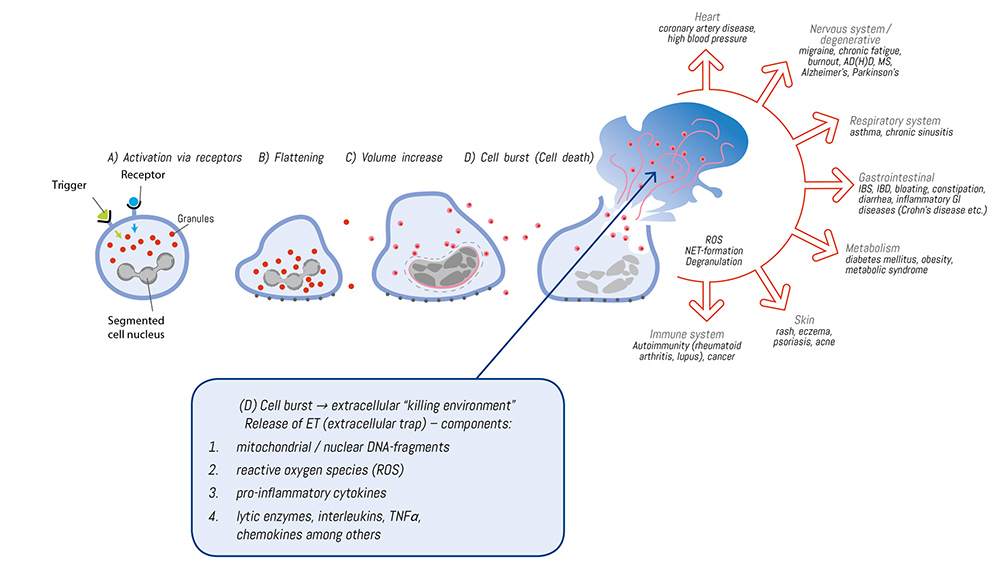Overwhelmed by the plethora of food sensitivity tests your patients ask about? The Alcat Test for Food and Chemical Sensitivities is the most reliable. But is it an IgG test?
Nutrition is biochemistry and one size does not fit all
When it comes to achieving good nutrition and being on the path to optimal health, individualization is crucial. As described by Roger Williams, author of Biochemical Individuality, we respond differently to what we ingest. Our nutritional needs are linked with our biological diversity. This is why what works for one person might not work for another.
As a practitioner dedicated to helping your patients promote optimal health through personalized nutrition, you want the most effective and practical strategies available. There are many factors that you consider while personalizing a food and supplement plan. Identifying foods that are causing adverse reactions is one very important consideration in order to effectively determine the best repertoire of foods for each one of your patients.
Adverse reactions include true food allergies (an IgE mediated response), intolerances (the inability to metabolize, digest or absorb a food component), and sensitivities (non -IgE mediated immune responses). Our focus here is food sensitivity testing.
Testing for food sensitivities has become increasingly popular for assisting individuals in the identification and elimination of food and chemical triggers. There are different types of food sensitivity testing available, IgG testing and The Alcat Test are the most popular. Which test is best for reliably identifying food sensitivity triggers?
We are often asked if the Alcat Test is an IgG test. The Alcat Test is not an IgG immunoglobulin/antibody test. IgG immunoglobulin testing does not assess or measure a pathological process and may simply reflect exposure and tolerance (not intolerance).
The most reliable food sensitivity test, The Alcat Test, is a leukocyte activation test that analyzes direct, immediate, pro-inflammatory cellular responses of the innate immune system.

Take a look at the differences between the Alcat Test and IgG testing. You’ll see what makes the Alcat Test the best choice for uncovering your patients’ food and chemical triggers.
| The Alcat Test
(Leukocyte Activation) |
IgG/IgG4
(Immunoglobulin G/antibody) |
| · Determines the reactivity of the “first responders”- cells of the innate immune system.
· Identifies foods that provoke an inflammatory response from innate immune cells · Uses precise impedance flow cytometry · WBCs are exposed to foods, herbs, spices, chemicals, additives. When WBCs are activated by an offender, changes in number and size of WBCs are detected
|
· Measures antibodies, a parameter of the specific immune system
· Identifies exposure to foods, not a pathological process/sensitivity · May indicate tolerance to the food rather than an intolerance · Uses the ELISA (Enzyme Linked Immunosorbent Assay) method · Mainly directed at protein agents
|
| · Only validated food sensitivity test
· Yale School of Medicine research supports the Alcat Test as a tool to identify foods/compounds that trigger the inflammatory reactions associated with food sensitivity · Research correlates leukocyte activation results with biomarkers indicative of an immune inflammatory response. · Research has demonstrated that the Alcat Test picks up known inflammatory pathways (PKC/NF-kB)
|
· Contemporary research suggests that the presence of IgG antibodies indicates exposure and tolerance. IgG4 antibodies may actually help sustain tolerance to a food or compound
· IgG class antibodies may block negative effects of IgE antibodies · Expert committees of international scientific societies do not recommend the use of IgG antibody testing for the detection of food sensitivities. |
| · Demonstrated high correlation with double blind oral challenges (the gold standard)
· Research confirms the high reproducibility, sensitivity, and specificity of the Alcat Test
|
· Poor specificity (high false positive results)
· Unnecessary dietary restrictions/false “diagnoses” · Not an indicator of food allergy or food sensitivity, but a natural physiological response of the immune system to food/allergen exposure |
| · Identifies reactivity to over 450 foods, ingredients, molds, chemicals, and botanicals |
There’s no need to guess what repertoire of foods is best for each of your patients. The best anti-inflammatory eating pattern for your patients is the one that is individualized using the Alcat Test. The Alcat Test identifies foods/ingredients that elicit an innate immune system/inflammatory response and those that do not.
____
References:
Gocki J, Bartuzi Z. Role of immunoglobulin G antibodies in diagnosis of food allergy. Postepy Dermatol Alergol. 2016 Aug;33(4):253-6. Doi: 10.5114/ada.2016.61600. Epub 2016 Aug 16. Review. PubMed PMID: 27605894; PubMed Central PMCID: PMC5004213. https://www.ncbi.nlm.nih.gov/pmc/articles/PMC5004213/
Stapel SO, Asero R, Ballmer-Weber BK; EAACI Task Force. Testing for IgG4 against foods is not recommended as a diagnostic tool: EAACI Task Force Report. Allergy. 2008 Jul;63(7):793-6. doi: 10.1111/j.1398-9995.2008.01705.x. Epub 2008 May 16. PubMed PMID: 18489614.
Lavine E. Blood testing for sensitivity, allergy or intolerance to food. CMAJ. 2012 Apr 3;184(6):666-8. doi: 10.1503/ cmaj.110026. Epub 2012 Mar 19. PubMed PMID: 22431905; PubMed Central PMCID: PMC3314037.
Carr S, Chan E, Lavine E, et al. CSACI Position statement on the testing of food-specific IgG. Allergy Asthma Clin Immunol. 2012 Jul 26;8(1):12. Doi: 10.1186/1710-1492-8-12. PubMed PMID: 22835332; PubMed Central PMCID: PMC3443017.
Uermösi C, Zabel F, Manolova V, et al. IgG-mediated down-regulation of IgE bound to mast cells: a potential novel mechanism of allergen-specific desensitization. Allergy. 2014 Mar;69(3):338-47. doi: 10.1111/all.12327. Epub 2013 Dec 19. Erratum in: Allergy. 2014 Aug;69(8):1118. PubMed PMID: 24354793.
Collins AM, Jackson KJ. A Temporal Model of Human IgE and IgG Antibody Function. Front Immunol. 2013 Aug 9;4:235. doi: 10.3389/fimmu.2013.00235. eCollection 2013. PubMed PMID: 23950757; PubMed Central PMCID: PMC3738878.
High Correlation of the Alcat Test Results with Double-blind Challenge (DBC) in Food Sensitivity Presentation at the 45th Annual Congress of the American College of Allergy and Immunology, Los Angeles, November 12-16, 1988; published in the Annals of Allergy.
Cellular responses to food in irritable bowel syndrome – an investigation of the Alcat Test Publication of pooled study results in the Journal of Nutritional Medicine, Vol. 2, No. 2, 1991.
Diagnostic Value of Alcat Test in intolerance to food additives compared with double-blind placebo-controlled (DBPC) oral challenges. Presented at the 52nd Annual Meeting of the American Academy of Allergy, Asthma & Immunology, New Orleans, LA. March 15-20, 1996. Publication in the Congress Proceedings of the Journal of Allergy and Clinical Immunology 1996;97:336.
Ali A, Weiss TR, McKee D, et al. Efficacy of individualised diets in patients with irritable bowel syndrome: a randomised controlled trial. BMJ Open Gastroenterol. 2017 Sep 20;4(1):e000164. doi: 10.1136/bmjgast-2017-000164. eCollection 2017. PubMed PMID: 29018540; PubMed Central PMCID: PMC5628288.
Ghani, A., Mehal, W., & Ali, A. Yale School of Medicine. (2014). Food reactivity on the ALCAT leukocyte activation test is associated with upregulation of CD11b on T cells. The Journal of Alternative and Complementary Medicine, 20(5), A35-A36.
Garcia-Martinez, Weiss, Ali, et al. Alcat test identifies food items that result in release of inflammatory markers & activation of innate immune cells. The Journal of Alternative and Complementary Medicine. June 2016, 22(6): A1-A142.
Garcia-Martinez, I., Weiss, T.R., Ali, A. and Mehal, W.Z. “The ALCAT Test Predicts the Release of DNA and Myeloperoxidase by Innate Immune Peripheral Blood Leukocytes Via a PKC Dependent Pathway,” presented at the The International Congress on Integrative Medicine and Health (ICIMH), Las Vegas, Nevada, USA, 2016.
Berardi, L., De Amici, M., Vignini, A., Mantegna, G. and Mosca, M. “Alcat Test identifies food intolerance in patients with gastrointestinal symptoms,” presented at the The XXVIII European Academy of Allergy and Clinical Immunology Congress Warsaw, Poland, 2009. [6] Pietschmann, N. “Food Intolerance: Immune Activation Through Diet-associated Stimuli in Chronic Disease,” Altern Ther Health Med, vol. 21, no. 4, pp. 42-52, 2015 Jul-Aug 2015.
Berardi, L., De Amici, M., Vignini, A., Torre, C. and Mosca, M. “Food intolerance in patients with cutaneous diseases: diagnostic value of the alcat test,” Allergy: European Journal of Allergy and Clinical Immunology, vol. 64, p. 490, 2009.











